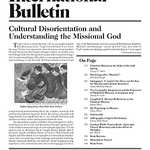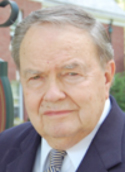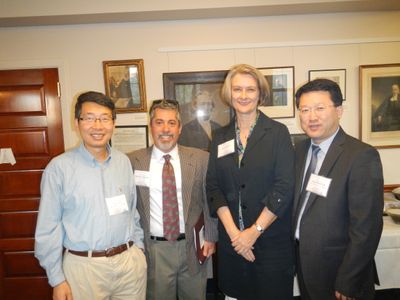Alumni
World Christianity: A Global Network
 In a recent visit to Boston, Bishop Abraham Mar Paulos of the Mar Thomas Church in Delhi reinforced the idea that world Christianity is, at least in part, a network of relationships. Bishop Abraham Mar Paulos, formerly known as Dr. K. U. Abraham, is an alumnus of the Boston University School of Theology, and friend of Dana Robert. With them in the photo is Jesudas Athyal, a Visiting Researcher at the Center for Global Christianity and Mission, and Inus Daneel, the former co-director of the Center, and now professor emeritus from BU.
In a recent visit to Boston, Bishop Abraham Mar Paulos of the Mar Thomas Church in Delhi reinforced the idea that world Christianity is, at least in part, a network of relationships. Bishop Abraham Mar Paulos, formerly known as Dr. K. U. Abraham, is an alumnus of the Boston University School of Theology, and friend of Dana Robert. With them in the photo is Jesudas Athyal, a Visiting Researcher at the Center for Global Christianity and Mission, and Inus Daneel, the former co-director of the Center, and now professor emeritus from BU.
Alumni News: Amos Yong appointed Fuller’s Director of the Center for Missiological Research
 Alumnus Dr. Amos Yong has been appointed as the new Director of the Center for Missiological Research and Professor of Theology and Mission at Fuller's School for Intercultural Studies. In his new role, he will also direct the School of Intercultural Studies' PhD program. You can read more about this exciting new appointment on Fuller's news-site.
Alumnus Dr. Amos Yong has been appointed as the new Director of the Center for Missiological Research and Professor of Theology and Mission at Fuller's School for Intercultural Studies. In his new role, he will also direct the School of Intercultural Studies' PhD program. You can read more about this exciting new appointment on Fuller's news-site.
Mission and a Geographic Imagination
 The July 2014 issue of the International Bulletin of Missionary Research contains a new article by alumnus Dr. David Scott, entitled "The Geographic Imagination and the Expansion of Methodist Missions in Southeast Asia," IBMR 38:3 (July 2014): 130–34.
The July 2014 issue of the International Bulletin of Missionary Research contains a new article by alumnus Dr. David Scott, entitled "The Geographic Imagination and the Expansion of Methodist Missions in Southeast Asia," IBMR 38:3 (July 2014): 130–34.
Synopsis: Missionary work by the Methodist Episcopal Church began in Southeast Asia in 1885 in Singapore. The Malaysia Mission spread throughout Southeast Asia, establishing work in Singapore, Penang, peninsular Malaysia, Borneo, Java, and Sumatra, as well as maintaining nominal oversight of mission work in the Philippines. By using geography to justify its extension across distance, the Malaysia Mission acted similarly to other global systems.
The article is available for free to online subscribers.
Bishop Josiah Kibira: Forty Years After Graduation

The 2014 commenement of Boston University marks the 40th anniversary of the graduation of one of the School of Theology's most important African graduates: the late Bishop Josiah Mutabuzi Kibira. Josiah Kibira graduated with an S.T.M. from the School of Theology in 1964. A pioneering local and international leader, Josiah Kibira became the first African to be elected bishop of the Evangelical Lutheran Church of Buhaya, Tanzania. He served in the World Council of Churches, and was the keynote speaker at the All Africa Conference of Churches General Assembly held in Addis Ababa, Ethiopia. Bishop Kibira was also the first African to be elected president of the Lutheran World Federation. The memory of Bishop Kibira’s leadership is marked by the establishment in 2010 of an institution of higher education in his name, the Josiah Kibira University College in Bukoba, Tanzania. His son, Josiah Mwesigwa Kibira, is an established director and screenwriter, who in 2010 released a documentary about his father, Bishop Kibira of Bukoba: An African Lutheran. For a fuller account of Bishop Kibira's life and service, see his biography on the Dictionary of African Christian Biography, and the History of Missiology.
Alum Charles Farhadian’s Book on Conversion Released
We have just received notice that Charles Farhadian's "Oxford Handbook of Religious Conversion", which was co-authored with Lewis R. Rambo, has been released. According to the book's listing on the Amazon website, it "offers a comprehensive exploration of the dynamics of religious conversion, which for centuries has profoundly shaped societies, cultures, and individuals throughout the world. Scholars from a wide array of religions and disciplines interpret both the varieties of conversion experiences and the processes that inform this personal and communal phenomenon."
Alum Receives Book of the Year Award!
Sung-Deuk Oak’s new book, The Making of Korean Christianity, published this fall as the first of the new Baylor Studies in World Christianity monograph series, has been named “Book of the Year” by Books & Culture magazine.
You may view the announcement here.
Distinguished Alum Jerry Anderson Honored in Rome
 Gerald (Jerry) Anderson (STH’55, GRS’60) met Pope Francis, gave a lecture and received an honorary Doctor of Missiology degree from the Pontifical Urbaniana University in Rome on November 14. The degree was presented to him by Cardinal Fernando Filoni, the Chancellor of the university. It was the first time an honorary degree has been given to a Protestant by this university that was founded in 1627 and is owned by the Sacred Congregation for the Evangelization of Peoples. Dr. Anderson, a former UM missionary in the Philippines and president of Scarritt College in Nashville, is emeritus director of the Overseas Ministries Study Center in New Haven, CT, and resides in Hamden, CT.
Gerald (Jerry) Anderson (STH’55, GRS’60) met Pope Francis, gave a lecture and received an honorary Doctor of Missiology degree from the Pontifical Urbaniana University in Rome on November 14. The degree was presented to him by Cardinal Fernando Filoni, the Chancellor of the university. It was the first time an honorary degree has been given to a Protestant by this university that was founded in 1627 and is owned by the Sacred Congregation for the Evangelization of Peoples. Dr. Anderson, a former UM missionary in the Philippines and president of Scarritt College in Nashville, is emeritus director of the Overseas Ministries Study Center in New Haven, CT, and resides in Hamden, CT.
Dana Robert and BU Alums at the WCF
Three of Dana Robert's former students attended the World Christianity Forum last week and got together for a photograph with her before departing. From the left are Xiyi Yao, Charles Farhadian, Dana Robert, and Sung Deuk Oak.
Alumna Anneke Stasson Presents at Missio Nexus North American Mission Leaders Conference
Anneke Stasson, a 2013 graduate of the Division of Religious and Theological Studies at Boston University, presented at the North American Mission Leaders Conference hosted by Missio Nexus in Dallas on September 19. She was invited as a representative of the Evangelical Missiological Society, a co-host of the conference, and her presentation was entitled, “Walter and Ingrid Trobisch and a Missiology of ‘Couple Power.’” Through her presentation, Stasson explored the way in which the Trobisches exemplified what Dana Robert has called “the missiology of the Christian home.” She unpacked the historical features of the missiology of the Christian home and examined the way in which the Trobisches departed from their missiological predecessors. Although the Christian home has traditionally been the domain of women missionaries, the Trobisches’ missiology of “couple power” blurred the boundaries between men’s work and women’s work. Both spouses spoke in public, wrote books, and, at least initially, both took care of the children. By talking about the Trobisches’ division of labor on the mission field and their work-family balance, Stasson aimed to get a conversation started about these issues in current evangelical mission. Her presentation was followed by a vigorous discussion about the gendered expectations of missionaries and mission agencies and the need to think creatively about our division of labor on the mission field.
Titus Presler reports from Pakistan
Rev. Dr. Titus Presler, Principal of Edwardes College in Peshawar, Pakistan, sent the following report yesterday after the horrendous slaughter of people attending All Saints' Church there. We at CGCM grieve for those killed and with those injured.
After church bombing Edwardes closes for 3 days and empathy abounds
In both grief and protest, the churches of Pakistan have declared three days of mourning and solidarity for the victims of today’s bomb blast at All Saints’ Church, Kohati Gate, Peshawar, in which it is reported that at least 150 people were killed and at least 200 were injured, many of them critically.
To its great credit, the government of Khyber Pakhtunkhwa, the province of which Peshawar is the capital, promptly endorsed that move and declared three days of mourning in solidarity with the Christian community and stated that what it called “missionary institutions” would be closed for the three days. To its equal credit, the Federal Government of the Islamic Republic of Pakistan soon followed suit.
The bombing’s impact on Edwardes College itself is considerable. We’re not sure how many of our students were killed at the church, but there are at least several. A number of alums were killed. Victims also included students and teachers at Edwardes College School, a feeder institution located on our campus. More information will be forthcoming over the next day or so.
Following is the letter that I sent out to all faculty and staff:
Dear Edwardes Community,
We are all shocked and grieving in the aftermath of the bombing at All Saints? Church, Kohati Gate, on this Sunday, Sept 22. The scale of the atrocity is terrible. News is still coming in, but it is said that about 150 people or more were killed and 200 or more were injured. The news has gone around the world.
Information is emerging, but a number of our current students were killed as were a number of Edwardes College alumni. The same is true of Edwardes College School and, of course, other church institutions throughout the city.
The churches of Pakistan have declared that all church institutions throughout the nation will be closed for three days of mourning for the dead and in solidarity with the bereaved and with the Christian community. The Khyber Pakhtunkhwa Government has endorsed this closure.
Members of the Management Team have discussed the matter and are agreed on the College’s participation in this closure. Therefore as an institution of the Church of Pakistan, Edwardes College will be closed Monday-Wednesday, Sept 23-25. The present plan is to reopen on Thursday, Sept 26.
Let us join in reaching out to those who are mourning their lost loved ones.
May we all know the blessing of God in this troubled time.
Canon Titus
Followers of events in Pakistan will feel today’s attack on one religious minority resonating with other attacks on other minorities in Pakistan, most notably the attacks in January and February on Shia Muslims in Quetta, in Balochistan, in which about 200 people were killed. Unfortunately attacks on religious minorities are on the rise.
Being stateside at the moment, I first heard of today’s event in a text from a Muslim faculty member this morning: “Very sad news a blast in Kohati Gate church Peshawar. 30 casualties. May God put their souls in peace.” Missing the church reference, I responded: “Terrible. Tnks for letting me know. God bless the victims.”
My interlocutor responded: “Amen. I’m too very sad for my Christian brothers and sisters. It was a cruel incident. May God help us. Amen.” To which I replied: “Do you mean that Christians were the targets?” “I’m not sure,” he answered at that early hour. Now we know they most definitely were.
I was touched by his concern for the Christian community.
As I was by the following email from another faculty member:
Dear All:
It’s really matter of shame for all of us, what happened today at Church at Kohati Gate Peshawar.
Islam is peaceful religion, and in Islam there is no place for such people who create violence with anyone, regardless of their religion, at any cost. Personally all my sympathies are with those who suffered today. May Allah bless their souls and may they rest in heaven. At this crucial time we all are with the Christian community side by side, so please do not think you are alone.
Oh Allah forgive us. As we are not following the right path, forgive us.
Ameen.
Such ecumenical spirit is crucial in any place and time, but especially so in Peshawar and in Pakistan today. So I thank God for such compassion and generosity of spirit between people of different religions.
